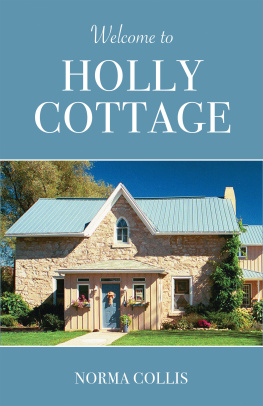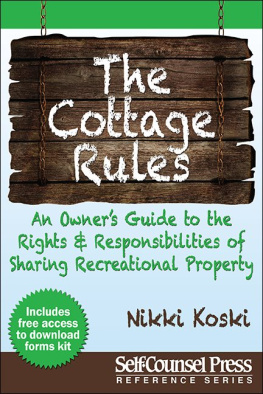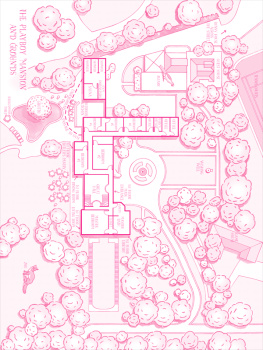Foreword
While many people dream of owning and operating a Bed and Breakfast, few of us are lucky enough to see that dream come true.
Over the years, many people have asked us where the idea to open a B&B came from. Likewise, theyve asked us to share some of the behind-the-scenes experiences and insider knowledge weve gained throughout the ever-changing and intriguing journey that our Bed and Breakfast business has taken us on.
Welcome to Holly Cottage.
Chapter 10
Good Neighbours
Our area of Southern Georgian Bay experiences extremely fierce snowstorms leading to phenomenal accumulations of snow. The hamlet of Woodford sits at a very high altitude and, consequently, snow-laden winds sweeping in off Georgian Bay hit that particular piece of high escarpment and drop their load of frozen precipitation right onto Woodford.
We learned to keep an emergency stock of tinned food in our pantry and mastered a whole new set of winter-driving skills. Snow tires went on the car in early October and werent removed until the end of May. If one did become stuck in a snowdrift or was suddenly introduced to a country ditch, no one ever passed you by. People know that leaving you there could very well mean that they were leaving you in a life-or-death situation. Most people travel with chains in their car trunk and are very well-versed in the fine art of pulling a vehicle out of a very sticky situation. These good Samaritans wont accept money for their efforts and will shrug off any words of praise.
We had a guest get stuck at the end of our driveway one snowy afternoon. David was away at a meeting, so it was up to me to help her dig, push, and finagle her car back onto the main road. We struggled with the vehicle and achieved nothing despite our efforts. Suddenly, out of seemingly nowhere, two pickup trucks pulled up and four young men jumped out of them. The very fit fellows picked up her small car and set it down on the main road. Their task completed, they disappeared just as quickly as they had arrived.
Oh, Im so embarrassed, she said.
Dont be, I replied. They saw we were in trouble and they did what needed to be done. Thats how it works around here.
One early piece of advice we carefully followed was offered to us shortly after purchasing our country home: Dont say anything derogatory about one local person to another local. Chances are theyll be related. These were certainly words to live by. We had read about six degrees of separation. There were actually only two degrees in our neck of the woods.
A very dear friend, who wasnt from the area originally, is well known for the very admirable trait of being very inclusive. She makes a point of introducing people to each other no matter what social situation she may be in. She laughingly told us about one occasion where her devotion to inclusivity really backfired on her. She was acting as an usher one Sunday morning at a local church. As she seated a couple in one of the pews, she took the time to introduce them to the other couple already seated in the same pew. All four people burst out laughing as she had just introduced a brother to his sister.
She said to us, I should have known.
Then we all said in unison, Two degrees of separation.
As I mentioned earlier, we decided not to tell the locals about our Bed and Breakfast plans until the time seemed right to do so. Change does not come easily to the area, and we wanted people to get to know us a little better before we hit them with our proposal. When we did finally tip our hand as to our plans, one local gentleman paused, seemed to give the news some consideration, and then said, Well now, Woodford used to have accommodations back in the horse-and-buggy days; I guess its okay if there are accommodations here again.
Indeed, at one time, Woodford boasted not one but three hotels. Local topography creates a steady uphill climb from Owen Sound to the summit of the escarpment and the hamlet of Woodford. It is an equally steep climb from the other direction if one is travelling from the town of Meaford. In the horse-and-buggy days, the horses pulling the stagecoach or cartage wagons had to be changed by the time they reached Woodford due to the extreme physical effort needed to reach the highest point of their trip, which was Woodford.
One hotel, located on the outskirts of the hamlet, was the dry hotel. At one time, there had been a large Quaker settlement in the immediate area. The choice of non-alcoholic accommodations seems quite logical. Along a local sideroad are the crumbling remains of the Woodford Quaker cemetery. Some faintly etched surnames can still be made out on the plain white tombstones. They bear the last names of some of the families whose descendants still live in the area.
If a traveller desired more powerful libations, they would disembark at the Woodford Hotel, located in the hamlet proper. This very large redbrick structure still stands in the village. Its now a private home. The present owners, when renovating, discovered that the former ladies drinking parlour, located to the left of the front entrance, remained in pristine condition. However, the gentlemens bar, to the right of the front door, showed lasting evidence of many a drunken brawl. The wainscoting on the walls and the wide plank floors showed deep scratches and dents; lasting scars from a tougher and more expressive time, where flying furniture and fist-to-fist combat were a frequent occurrence.
The locals told us that, in a large, empty field directly across from our home, there sat a third hotel. This was a more upscale hotel and, of course, the rooms were more costly. This piece of land is now owned by the Bruce Trail Conservancy. Each spring, random bunches of daffodils still grow where, I imagine, the hotels formal gardens might have been located. I can picture those more subdued travellers sitting on a broad veranda, sipping a sherry while waiting to be shown to their private and well-appointed bedrooms.
Since we knew very little of Davids grandparents history and their connection to Woodford itself, we were happy to have the use of a history book of the area that had been compiled and written by the local womens institute in the early 1900s. An elderly woman who was the local historian put this book in our hands and also filled us in on her own knowledge of our farmhouse and its connection to Davids maternal grandparents. A late eighteenth-century local census listed Davids grandfather as a hostelry man. We had to look that one up. We learned that title is given to someone who handles and takes care of horses. The job was often associated with livery stables and hotels. We dont know which hotel he may have worked at, but he did have the three to choose from. His other job was as the rural route #3 mail-delivery person. He collected the mail from the Woodford post office, then he rode his horse to Bognor, a small village south of Woodford. There he handed off the mail to a gentleman who would proceed to deliver all the Bognor-area mail.
Back in the day, Woodford was a thriving business hub, handling the Royal Mail post office, located in Woodford, added to the importance of the village. The original Woodford postmasters desk now resides in a museum in Ottawa. Its a magnificent piece of elaborately carved furniture, probably ten feet in height, which has led us to speculate that it may have resided in the old hotel in the main part of the hamlet. The soaring ceilings in that structure would have easily accommodated such a large and magnificent piece.
Looking back through old documents housed in the country archives, we could find no evidence that Davids grandparents every actually owned our 1878 farmhouse. We can only speculate that they resided there as renters until theyd accumulated enough cash to purchase what was to become the family farm in the Irish Block.












